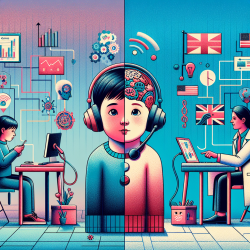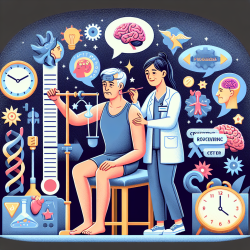Introduction
In the realm of speech-language pathology, it is imperative to understand the multifaceted factors that influence a child's development. One such factor is the broader social and political environment. Recent research, particularly the study titled "Threat to democracy: Physical and mental health impact of democracy movement in Hong Kong," offers valuable insights that can help practitioners improve their skills and outcomes for children.
Understanding the Research
The study examined the mental and physical health impacts of the Umbrella Movement in Hong Kong. It found that nearly half of the respondents reported moderate to severe anxiety symptoms, and about 14.4% reported moderate to severe depressive symptoms. The research highlighted the significant role of personal and social resource loss in these adverse health outcomes.
Key Findings and Their Implications
- Anxiety and Depressive Symptoms: 47.35% of respondents experienced moderate to severe anxiety, while 14.4% faced moderate to severe depression.
- Resource Loss: Personal and social resource losses were critical predictors of poor mental health outcomes.
- Socioeconomic Factors: Lower education levels, income, and being unmarried were associated with higher anxiety and depressive symptoms.
Applying the Insights in Practice
For practitioners, these findings underscore the importance of considering the broader social context when assessing and treating children. Here are some actionable steps:
- Holistic Assessments: Incorporate questions about family stressors, community events, and socioeconomic factors into assessments.
- Resource Support: Advocate for and provide resources that can help mitigate the impacts of social and personal resource loss.
- Community Engagement: Engage with community organizations to understand the local social dynamics and their potential impact on children.
Encouraging Further Research
While this study provides a valuable foundation, further research is needed to explore the long-term impacts of political movements on children's development. Practitioners are encouraged to contribute to this growing body of knowledge by conducting and participating in research studies.
Conclusion
Understanding the broader social and political contexts can significantly enhance the effectiveness of speech-language pathology interventions. By integrating the insights from the "Threat to democracy: Physical and mental health impact of democracy movement in Hong Kong" study, practitioners can better support the mental and physical well-being of children.
To read the original research paper, please follow this link: Threat to democracy: Physical and mental health impact of democracy movement in Hong Kong.










